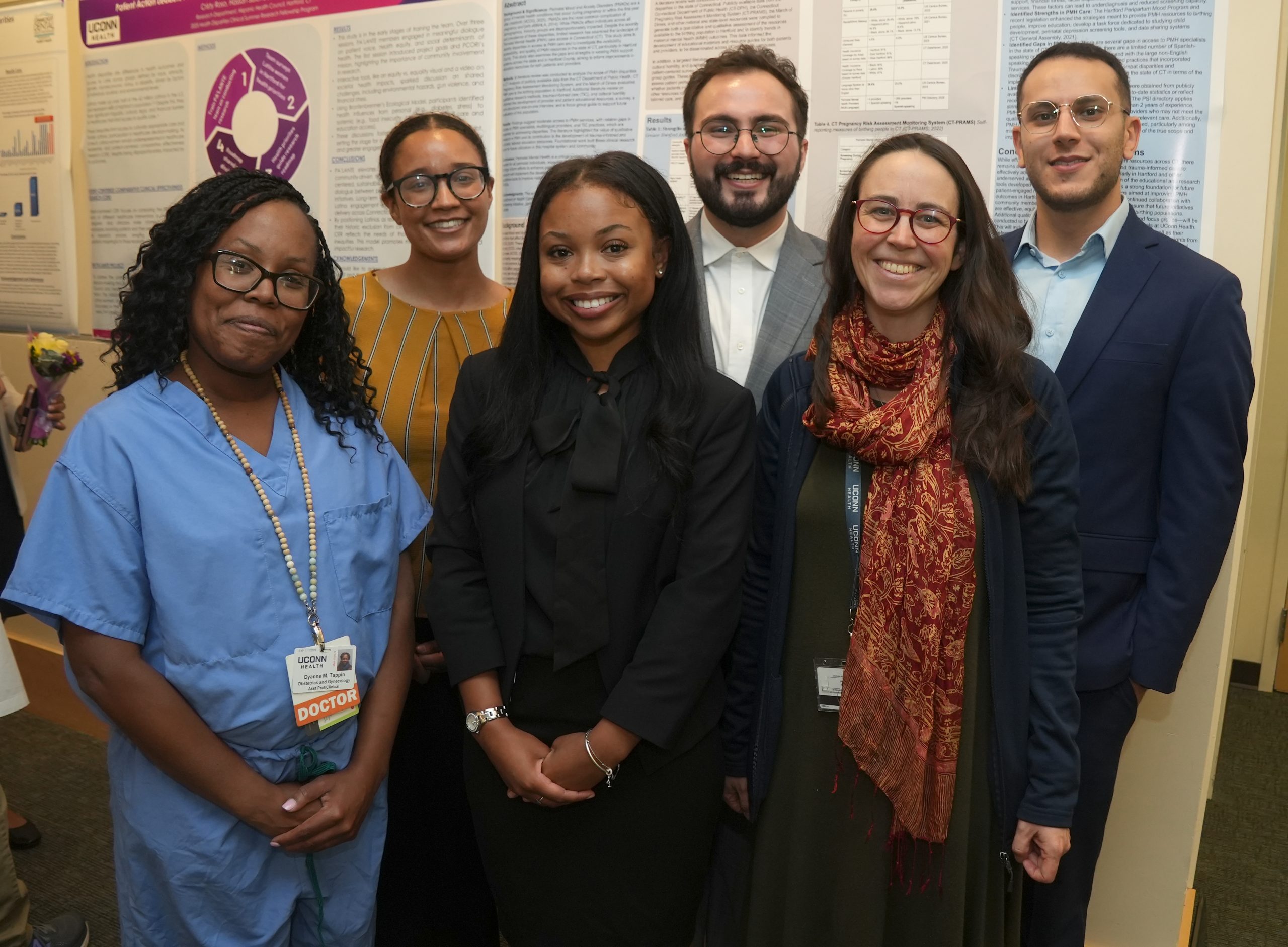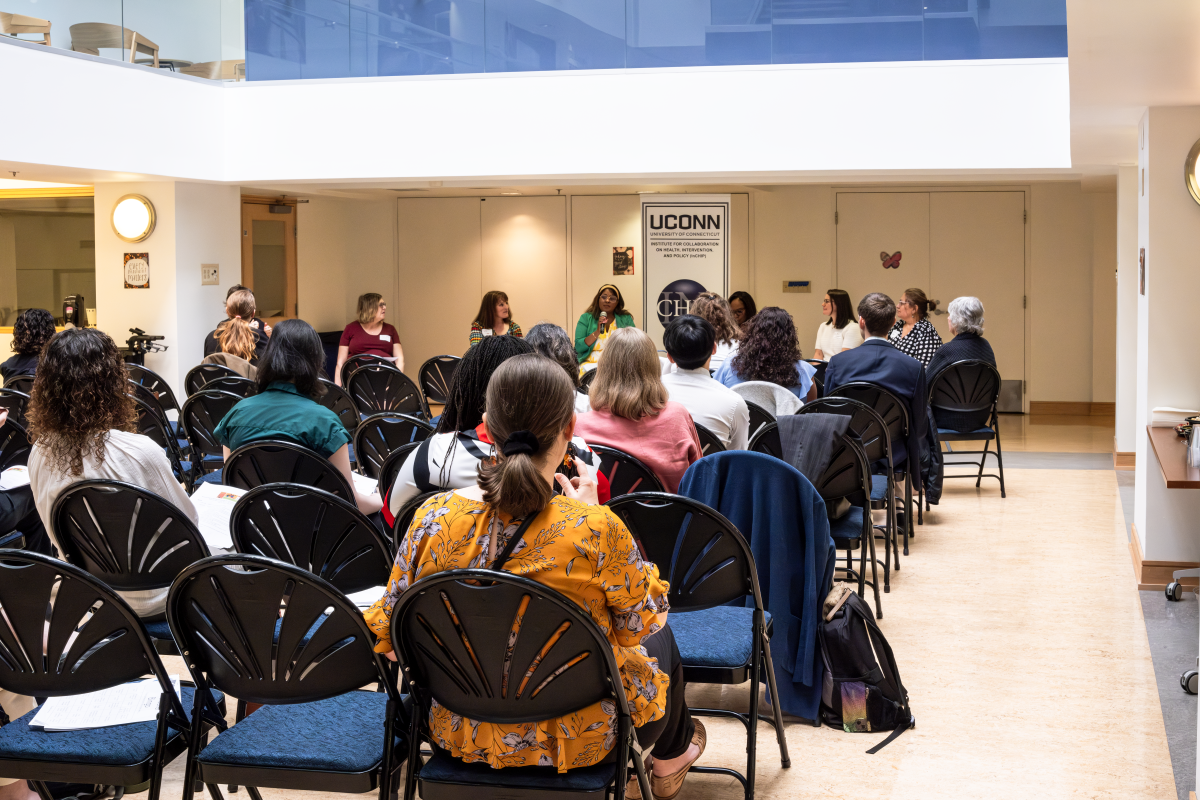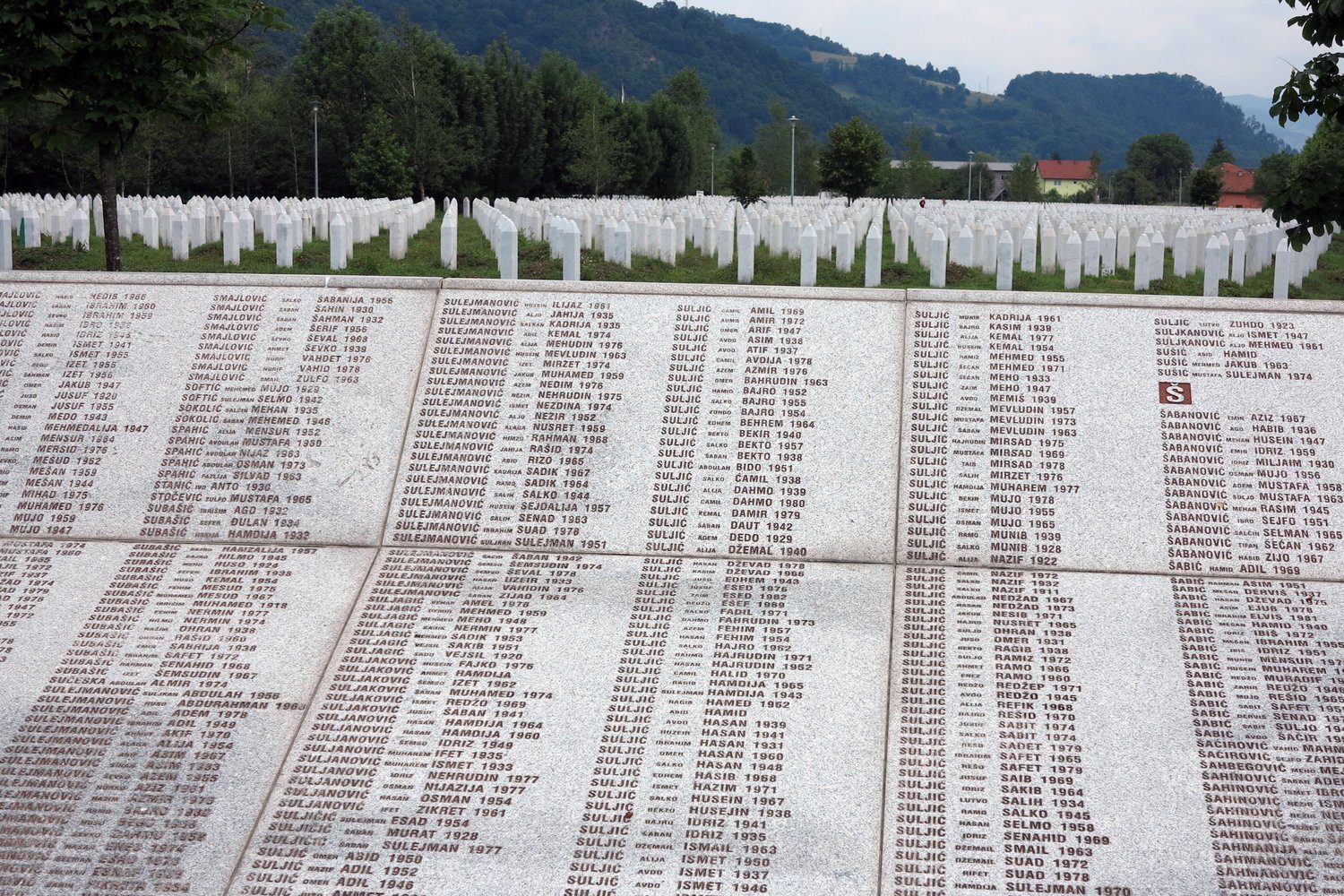10 Questions With Alumna Kelli Bates, Former Student-Athlete Working at Paris Olympics
In our recurring 10 Questions series, UConn’s Neag School of Education interviews students, alumni, faculty, and others to offer a glimpse into their Neag School experience and their current careers, research, or community activities.
The Neag School’s Sport Management Program provided a solid foundation of knowledge to Kelli Bates ’19 ED, who is a games operations specialist with the U.S. Olympic and Paralympic Committee (USOPC). As a student-athlete and game day assistant intern with UConn Athletics, Bates got an inside look behind the scenes of successful events. She says these formative experiences at UConn have been instrumental in navigating the sport management field.
Q: How did your sport management degree and internships as an undergraduate student at UConn help you in your current role?
A: The Sport Management Program at UConn helped me build a great foundation of knowledge I lean on in my current role with the U.S. Olympic and Paralympic Committee. We learned about all the different functional areas in sport management and the impact each area has on events. While at UConn, I was a game day assistant intern for the event management and marketing department, which gave me a front-row seat to the faces and roles behind the events that helped make them happen. Gaining knowledge of the types of roles I could work toward was the first step in taking me down this path. My internships at UConn helped build my workplace confidence and professional network.
The Sport Management Program at UConn helped me build a great foundation of knowledge I lean on in my current role with the U.S. Olympic and Paralympic Committee. — Kelli Bates
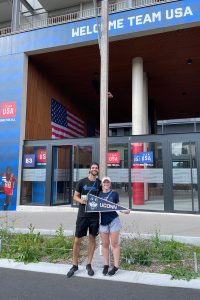
Q: While at UConn, you were also a student-athlete. How did your softball experience at UConn prepare you for your current role? Are there specific skills or lessons from your athletic career that you find particularly useful in your job?
A: Being a student-athlete for UConn was an incredible experience. It first showed me how impactful it can be to perform in something that I love while representing something bigger than myself. It grew my passion for being on a team and getting to work hard for the person next to me while we focus and aim for a larger goal together. I built the skills to overcome adversity, adapt to changing environments, and take on new challenges and responsibilities. A central lesson I learned as I journeyed into the world of networking and beginning my career is how transferable many of the skills we learn as student-athletes are to a workplace environment and how speaking to and being able to talk about them can enhance professional development and networks.
Q: What were some of your favorite memories while attending UConn?
A: A few core memories that stand out to me from my four years at UConn are:
- Spending more time with my family who live back east and came to support me at all our home games
- My first collegiate game
- Traveling to Hawaii for our spring break in 2017
- Watching our women’s basketball team win their 100th game during their win streak in person
- Traveling the country with my best friends!
Q: Why did you pursue a professional career with the U.S. Olympic & Paralympic Committee?
A: I came across the U.S. Olympic & Paralympic Committee internship website when I was a junior in the Sport Management Program, and it immediately stood out to me as a path I wanted to follow. I was pulled to it because it combined multiple things I am passionate about: sports, international events, and a mission I believe in. Once I had pursued networking with people in the movement, my interest in pursuing this work grew even more because of my positive interactions with the team behind the team.
Q: Can you share how being a sport management major and a student-athlete have shaped your approach to teamwork and cooperation in organizing such a large-scale sporting event?
A: Teamwork and collaboration are staples of how I approach my current role. To bring such a large-scale event to life, having strong working relationships with internal colleagues and counterparts from around the world and different organizations is imperative. The emotional intelligence I gained as a sport management major and a student-athlete at UConn empowers me to perform stronger while I represent Team USA. Building relationships and networking have supported my success in countless ways, but learning from other countries and teammates who have gone through similar challenges and experiences allows us to work and perform more efficiently.
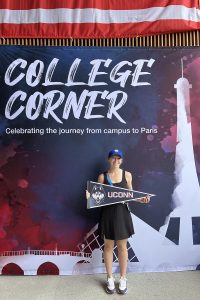
Q: What are your primary responsibilities in your current role? How do these contribute to the overall success of the Paris Summer Games?
A: As a games operations specialist with the USOPC, I am responsible for the Games Registration and Accreditation processes for all Games we support on the Olympic and Pan American side of the USOPC (Winter, Summer, Pan American, and Junior Pan American Games). This includes many things, but a few main focuses are:
- Managing the review and validation process for all Games Registration data for Team USA delegations
- Liaising with the Organizing Committee Accreditation team to coordinate access and privileges for the entire Team USA delegation
- Serving on the village-based staff during the Games, assisting with village operations and logistics
Q: You previously worked at the 2020 Tokyo Summer Olympics and the 2022 Beijing Winter Games. How do the 2024 Paris Games compare so far?
A: The Tokyo and Beijing Games were their own experiences due to COVID-19, but they were both great experiences to learn from and reflect on. These Paris Games have been my favorite so far for several reasons. The Paris staff have been incredible partners, and being here and building our relationships in person has been a pleasure. Seeing our athletes experience these Games and their accomplishments with their loved ones is an emotional reminder of why we do what we do here at the USOPC.
Q: Can you share a memorable moment from working at the Paris Summer Games so far? What has made it special for you?
A: A special moment for me thus far in these Games has been seeing friends I met for the first time in Tokyo at the Olympics and spending time together in Paris three years later. It’s exciting to see how far we have all come and witness these Games coming together after planning them for years. Additionally, one of the friends I made in Tokyo also graduated from UConn in 2013, and we had the chance to see each other again here in Paris and even take a picture with a UConn flag! This is one of the many friendships I am grateful to have made through this role, and I am excited to follow along through future events and experiences.
A: In what ways has working for the U.S. Olympic & Paralympic Committee aligned with your career goals and aspirations? Have there been any unexpected opportunities or challenges along the way?
A: Working for the USOPC has aligned with my career goals and aspirations by launching me into international sports and making an impact through an organizational mission I believe in. It has challenged me to learn quickly, but the knowledge I’ve gained since beginning this role has been monumental. The foremost unexpected opportunity of this role has been going to four Games in my four years. It has provided me with experiences to create international relationships, travel the world, and support our Team USA delegation as they chase their dreams.
While at UConn, the Sport Management Program opened my eyes to the different roles in a collegiate athletics environment, and then I extended that further by going to graduate school. — Kelli Bates
Q: What advice would you give current student-athletes aspiring to work in sport management or event organization, particularly with major international events like the Olympics?
A: A significant first step to aspiring to work in sport management or international events is gaining a better understanding of the types of jobs. While at UConn, the Sport Management Program opened my eyes to the different roles in a collegiate athletics environment, and then I extended that further by going to graduate school. Taking advantage of being a student and asking to have informational meetings with staff currently in the space you’re interested in provides excellent insight into different roles while building a relationship and network. I would encourage you to try areas you don’t know much about and even volunteer. Lastly, take a chance on yourself and follow your passion! Following my interest in the Olympics and taking an unpaid summer internship for USA Rugby has led me to where I am now and is one of the best chances I could’ve taken.
To learn more about UConn’s Sport Management Program, visit sport.education.uconn.edu.
Latest UConn Today
- Incoming UConn Medical Students Get Hands-On Summer Research ExperienceFor the first time the Health Career Opportunities Program of UConn Health offered matriculating UConn medical students summer research opportunities.
- Partnering with Communities to Improve HealthInCHIP’s Community Engagement Research Core’s latest networking event offers insights for successful community research partnerships
- Study Highlights Higher Rates, Risk Factors for Non-Fatal OverdosesA new opioid overdose study has identified several key risk factors associated with non-fatal overdoses drawing from a sample of people who use opioids in New Haven
- Archiving for Justice, Truth, and Memory: Unpacking the Baggage of What Went BeforeReflections on the importance of the newest addition to UConn’s ICTY Digital Archives, the Srebrenica Genocide Archives Collection.
- Multiple Sclerosis Patient Sees Bright FutureFrom unheard to understood
- UConn AUKUS Scholars Explore Undersea Vehicle Technology, International Collaborations in AustraliaFive College of Engineering students studied systems thinking and interdisciplinary teamwork essential in modern undersea vehicle development







